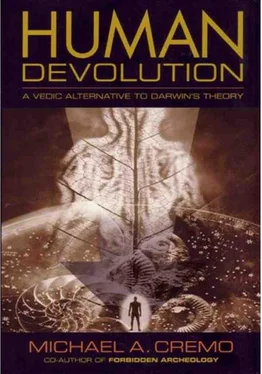Michael Cremo - Human Devolution - A Vedic Alternative To Darwin's Theory
Здесь есть возможность читать онлайн «Michael Cremo - Human Devolution - A Vedic Alternative To Darwin's Theory» весь текст электронной книги совершенно бесплатно (целиком полную версию без сокращений). В некоторых случаях можно слушать аудио, скачать через торрент в формате fb2 и присутствует краткое содержание. Год выпуска: 2003, ISBN: 2003, Издательство: Torchlight Publishing, Жанр: Старинная литература, на английском языке. Описание произведения, (предисловие) а так же отзывы посетителей доступны на портале библиотеки ЛибКат.
- Название:Human Devolution: A Vedic Alternative To Darwin's Theory
- Автор:
- Издательство:Torchlight Publishing
- Жанр:
- Год:2003
- ISBN:9780892133345
- Рейтинг книги:4 / 5. Голосов: 1
-
Избранное:Добавить в избранное
- Отзывы:
-
Ваша оценка:
- 80
- 1
- 2
- 3
- 4
- 5
Human Devolution: A Vedic Alternative To Darwin's Theory: краткое содержание, описание и аннотация
Предлагаем к чтению аннотацию, описание, краткое содержание или предисловие (зависит от того, что написал сам автор книги «Human Devolution: A Vedic Alternative To Darwin's Theory»). Если вы не нашли необходимую информацию о книге — напишите в комментариях, мы постараемся отыскать её.
Human Devolution: A Vedic Alternative To Darwin's Theory — читать онлайн бесплатно полную книгу (весь текст) целиком
Ниже представлен текст книги, разбитый по страницам. Система сохранения места последней прочитанной страницы, позволяет с удобством читать онлайн бесплатно книгу «Human Devolution: A Vedic Alternative To Darwin's Theory», без необходимости каждый раз заново искать на чём Вы остановились. Поставьте закладку, и сможете в любой момент перейти на страницу, на которой закончили чтение.
Интервал:
Закладка:
Sir William F. Barrett (1918, pp. 184–185), a physicist and Fellow of the Royal Society, was a founder of the Society for Psychical Research. He investigated an interesting case of communication with the dead. During the First World War, Mrs. Travers Smith, wife of a prominent Dublin medical doctor, and Miss C., daughter of another medical man, were attempting, with others, to establish communication with the dead through an ouija board. In using an ouija board, one places one’s fingers lightly on a movable pointer, and the spontaneous movements of the pointer toward letters printed on the board spell out words. Miss C.’s cousin, an officer in the British Army, had been killed in France a month before the sittings. During one sitting, the name of the dead officer was unexpectedly spelled out by the ouija board. Miss C. then asked, “Do you know who I am?” In reply came her name and the following message: “Tell mother to give my pearl tie-pin to the girl I was going to marry, I think she ought to have it.” None of the sitters knew of this engagement. They asked for the name and address of the girl. The full name of the girl was given, along with an address in London. But when the sitters sent a letter to that address, it was returned as undeliverable. The sitters concluded the message had not been genuine. Six months later, the sitters learned from personal papers of the deceased officer sent by the War Office that he had in fact been engaged to the very lady whose name was given by the ouija board communication. She was mentioned in the officer’s will. The officer had, however, never mentioned her to any of his relatives. Among his personal effects there was a pearl tie pin. Barrett (1918, p. 185) noted “Both the ladies have signed a document they sent me, affirming the accuracy of the above statement. The message was recorded at the time, and not written from memory after verification had been obtained. Here there could be no explanation of the facts by subliminal memory, or telepathy or collusion, and the evidence points unmistakably to a telepathic message from the deceased officer.” Sir Oliver Joseph Lodge (1851–1940) made important contributions to research in electromagnetic radiation and radio communications. He also documented a famous case of communication with a departed human, his son Raymond. In his biographical encyclopedia of famous scientists, Isaac Asimov (1982, p. 530) wrote about Lodge: “He became a leader of psychical research, and is one of the prime examples of a serious scientist entering a field that is usually the domain of quacks.” I don’t agree with Asimov that psychical research is the domain of quacks. The number of serious scientists conducting psychical research, and getting positive results, is quite impressive. It is Asimov’s statement that seems rather quacklike.
Lodge (1916, p. 83) wrote: “I have made no secret of my conviction, not merely that personality persists, but that its continued existence is more entwined with the life of every day than has been generally imagined; that there is no real breach of continuity between the dead and the living; and that methods of intercommunication across what has seemed to be a gulf can be set going in response to the urgent demand of affection.”
On September 17, 1915, Lodge received news of his son Raymond’s death in military action in Europe during World War I. On September 25, Mrs. Lodge was having a sitting with a medium, Mrs. Leonard. At that time, Mrs. Lodge’s identity was unknown to the medium. The medium and her guests were sitting at a round table. The medium would begin to recite the letters of the alphabet until the table tilted. The letter sounded at the moment of the tilt would be recorded, and then the process would be repeated until a message was spelled out. (This may seem less quaint in light of today’s handheld internet communication devices, which compel one to spell out messages in ways hardly less cumbersome and time consuming.) From the standpoint of spiritualists, the tilting of the table was accomplished by the departed spirits. Skeptics would claim the medium controlled the table and composed messages using surreptitiously obtained information about the living and the dead. To counter such doubts, one has to demonstrate that the medium had no knowledge of the persons involved, as appears to be the case here. During her anonymous séance with Mrs. Leonard, Mrs. Lodge received the following message from a spirit called Raymond: “Tell father I have met some friends of his.” Mrs. Lodge asked for the name of one of these friends. Raymond gave the name Myers, the departed psychical researcher, who was in fact known to Lodge.
On September 27, Lodge himself showed up for a sitting, which had been arranged anonymously through a Mrs. Kennedy. According to Lodge, Mrs. Leonard did not know his identity. At this sitting, the communication with departed spirits was not through table tilting, but through the medium’s contact with her control, a young girl named Feda. When the medium went into trance, and came under the control of Feda, Lodge was told that there was present a young man, whose description matched Raymond. Feda said through Mrs. Leonard: “He finds it difficult, he says, but he has got so many kind friends helping him. He didn’t think when he waked up first that he was going to be happy, but now he is, and as he is a little more ready he has got a great deal of work to do” (Lodge 1916, p. 98).
On September 28, Lodge and his wife together attended a sitting with Mrs. Leonard. The communication was through table tilting (Lodge 1916, pp. 140–142). The first spirit contacted was named Paul, who said, in answer to a question posed by Lodge, that, yes, he had brought Raymond. The next message from Paul said, “Raymond wants to come himself.” Lodge asked Raymond to give the name of an officer. Lodge was anticipating that he would give the name of Lieutenant Case, who was one of the last persons to see Raymond alive, after he was wounded. Instead, Raymond spelled out the name Mitchell. Mrs. Lodge later said, “Raymond, I don’t know Mitchell.” Raymond answered, “No.” Lodge then asked, “Well, that will be better evidence?” Raymond said, “Yes.” Lodge asked, “Is that why you chose it?” Raymond again replied, “Yes.” Raymond then gave three letters: “a,” “e,” and “r.” The medium said, “No, that can’t be right?” But the letters continued coming, spelling out the word “aeroplane.” Lodge asked, “You mean that Mitchell is an aeroplane officer?” The answer was a firm “yes.” Also, Lodge asked Raymond to give the name of a brother. The tilting table gave the letters “n,” “o,” “r,” “m,” and “a.” Lodge interrupted the communication, thinking that the intended name, Norman, was a mistake. During this session, Lodge asked Raymond how he was working the table.The message, received letter by letter, was, “You all supply magnetism gathered in medium, and that goes into table, and we manipulate” (Lodge, 1916, p. 146).
The name “Mitchell” given by Raymond in connection with the word “aeroplane” was quite significant. No one present at the sitting knew an officer of that name. Lodge conducted extensive research, and for weeks obtained no results. Relevant personnel lists had not yet been published (Lodge 1916, p. 146). Lodge eventually did obtain some information about Mitchell: “After several failures at identification I learnt, on 10 October, through the kind offices of the Librarian of the London Library, that he had ascertained from the War Office that there was a
2nd Lieut. E. H. Mitchell now attached to the Royal Flying Corps. Accordingly, I wrote to the Record Office, Farnborough; and ultimately, on
6 November, received a post card from Captain Mitchell.” In his letter to Lodge, Mitchell said “I believe I have met your son, though where I forget” (Lodge 1916, p. 149).
Читать дальшеИнтервал:
Закладка:
Похожие книги на «Human Devolution: A Vedic Alternative To Darwin's Theory»
Представляем Вашему вниманию похожие книги на «Human Devolution: A Vedic Alternative To Darwin's Theory» списком для выбора. Мы отобрали схожую по названию и смыслу литературу в надежде предоставить читателям больше вариантов отыскать новые, интересные, ещё непрочитанные произведения.
Обсуждение, отзывы о книге «Human Devolution: A Vedic Alternative To Darwin's Theory» и просто собственные мнения читателей. Оставьте ваши комментарии, напишите, что Вы думаете о произведении, его смысле или главных героях. Укажите что конкретно понравилось, а что нет, и почему Вы так считаете.












